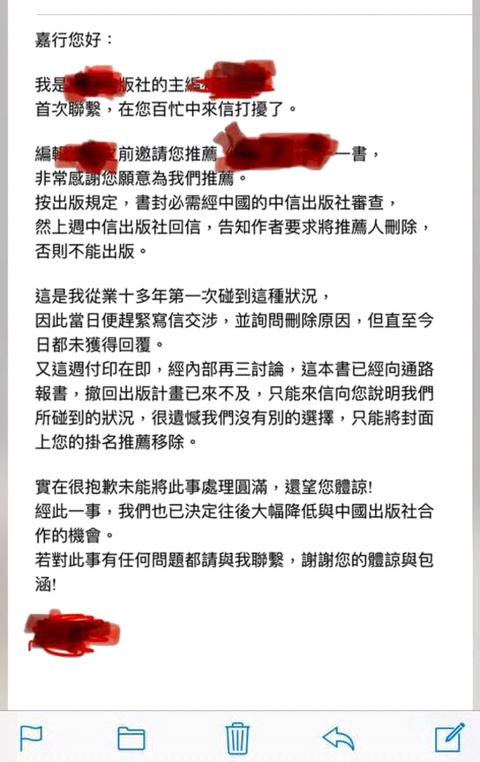Democratic Progressive Party (DPP) lawmakers yesterday condemned Chinese censorship after entertainer Chen Chia-hsing (陳嘉行) said his recommendation for a new book was removed due to pressure from a Chinese publisher.
Chen yesterday posted on Facebook an image of a letter he received from the editor-in-chief of the unidentified book’s Taiwanese publisher.
In the letter, the editor-in-chief, whose name was blacked out in the online image, began by thanking Chen for agreeing to write a recommendation for the new book.

Photo: Screengrab from Facebook
According to publishing regulations, the book cover must be reviewed by China’s CITIC Press Group, the letter said.
Last week, the Chinese publishing company informed the book’s author that Chen’s recommendation must be removed if the book is to be published, it said.
The editor-in-chief said that having worked in the industry for more than 10 years, it was the first time they ever encountered something like this.
The editor-in-chief asked the Chinese publisher for a reason, but has yet to receive a response, the letter said.
Since it is too late to withdraw plans to publish the book, the company had no choice but to remove Chen’s recommendation from the cover, it said, expressing the company’s regret.
In a brief statement posted alongside the image, Chen apologized for causing the Taiwanese publisher trouble and said he is aware of Chinese censorship, especially toward Taiwanese.
“Politics is politics, publishing is publishing,” he wrote.
Chen might have run afoul of Chinese censors because he had previously publicly expressed his support for President Tsai Ing-wen (蔡英文).
In his statement, Chen also called on the Chinese Nationalist Party (KMT) to “take a look at Tibet” as it proposes signing a peace treaty with China.
The incident highlights the difference in freedom of speech in Taiwan and China, DPP Legislator Liu Shyh-fang (劉世芳) said.
In Taiwan, excluding cases that contravene defamation laws or other laws, any views that are critical of politicians, such as Tsai or Kaohsiung Mayor Han Kuo-yu (韓國瑜), are protected by freedom of speech, she said.
In contrast, Chinese censorship is not limited to publishing, but also extends to television shows, she said, citing as an example reports that a male entertainer’s ears were blurred out because he was wearing earrings.
DPP Legislator Chuang Ruei-hsiung (莊瑞雄) called the slogans that politicians use to describe Taiwan-China relations, such as “the two sides of the Taiwan Strait are one family,” ironic in light of the incident.
The incident shows that China maintains strict control on published content, DPP Legislator Rosalia Wu (吳思瑤) said.
China has repeatedly attempted to weaken or eliminate Taiwan’s “most precious” values, including freedom of thought, democratic speech and human rights, she said.
Although what happened in Chen’s case is new, similar situations could continue to occur, she added.

US President Donald Trump yesterday announced sweeping "reciprocal tariffs" on US trading partners, including a 32 percent tax on goods from Taiwan that is set to take effect on Wednesday. At a Rose Garden event, Trump declared a 10 percent baseline tax on imports from all countries, with the White House saying it would take effect on Saturday. Countries with larger trade surpluses with the US would face higher duties beginning on Wednesday, including Taiwan (32 percent), China (34 percent), Japan (24 percent), South Korea (25 percent), Vietnam (46 percent) and Thailand (36 percent). Canada and Mexico, the two largest US trading

China's military today said it began joint army, navy and rocket force exercises around Taiwan to "serve as a stern warning and powerful deterrent against Taiwanese independence," calling President William Lai (賴清德) a "parasite." The exercises come after Lai called Beijing a "foreign hostile force" last month. More than 10 Chinese military ships approached close to Taiwan's 24 nautical mile (44.4km) contiguous zone this morning and Taiwan sent its own warships to respond, two senior Taiwanese officials said. Taiwan has not yet detected any live fire by the Chinese military so far, one of the officials said. The drills took place after US Secretary

CHIP EXCEPTION: An official said that an exception for Taiwanese semiconductors would have a limited effect, as most are packaged in third nations before being sold The Executive Yuan yesterday decried US President Donald Trump’s 32 percent tariff on Taiwanese goods announced hours earlier as “unfair,” saying it would lodge a representation with Washington. The Cabinet in a statement described the pledged US tariffs, expected to take effect on Wednesday next week, as “deeply unreasonable” and “highly regrettable.” Cabinet spokeswoman Michelle Lee (李慧芝) said that the government would “lodge a solemn representation” with the US Trade Representative and continue negotiating with Washington to “ensure the interests of our nation and industries.” Trump at a news conference in Washington on Wednesday announced a 10 percent baseline tariff on most goods

THUGGISH BEHAVIOR: Encouraging people to report independence supporters is another intimidation tactic that threatens cross-strait peace, the state department said China setting up an online system for reporting “Taiwanese independence” advocates is an “irresponsible and reprehensible” act, a US government spokesperson said on Friday. “China’s call for private individuals to report on alleged ‘persecution or suppression’ by supposed ‘Taiwan independence henchmen and accomplices’ is irresponsible and reprehensible,” an unnamed US Department of State spokesperson told the Central News Agency in an e-mail. The move is part of Beijing’s “intimidation campaign” against Taiwan and its supporters, and is “threatening free speech around the world, destabilizing the Indo-Pacific region, and deliberately eroding the cross-strait status quo,” the spokesperson said. The Chinese Communist Party’s “threats